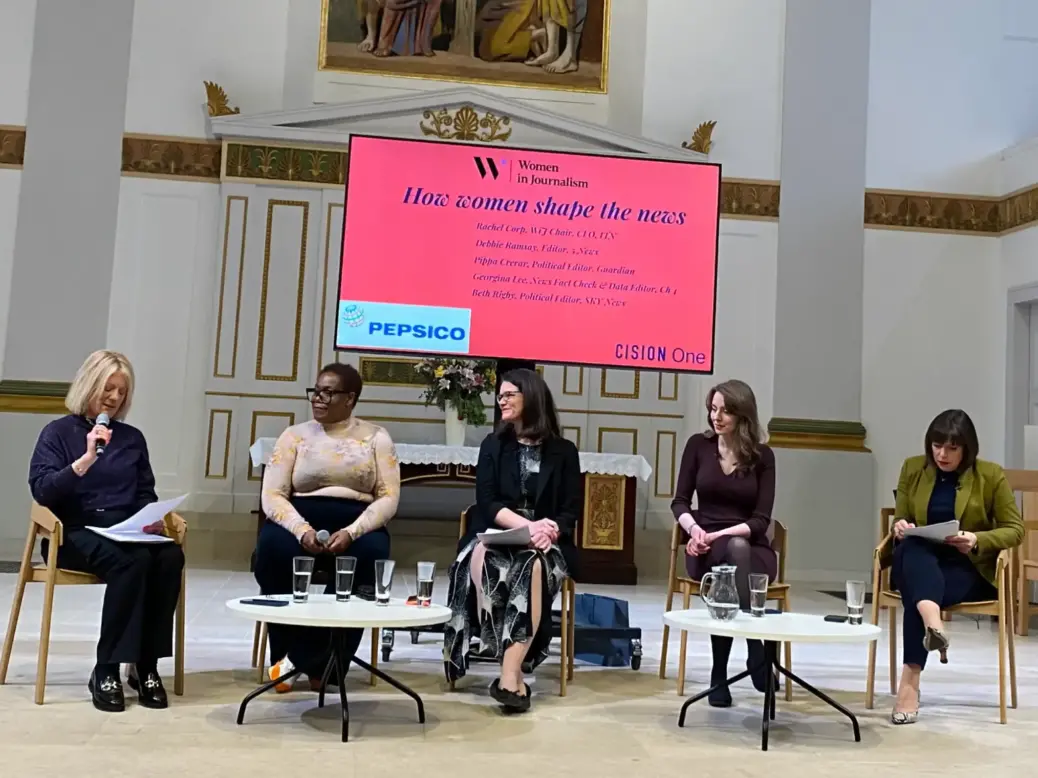
Newspaper front pages will still set the UK agenda in this year’s expected general election despite the waning influence of print, according to Guardian political editor Pippa Crerar.
Crerar, who was named Journalist of the Year at the British Journalism Awards 2022 for her Partygate reporting while at the Mirror, said it is “definitely the case with the decline in print sales that a newspaper’s editorial position doesn’t have the impact maybe it did when Labour were last knocking on the door of Downing Street in 1997”.
Crerar was speaking at Women in Journalism’s How Women Shape The News event in London on Thursday.
She referred to Tony Blair flying to Australia in July 1995 to meet Rupert Murdoch, a strategy of wooing that eventually won him the endorsement of The Sun.
“The wooing of newspaper proprietors and editors in order to win endorsements might not be quite as pressing as it used to be,” she said, “but our coverage still absolutely sets the agenda.
“And what I really notice is that often broadcasters follow up what’s on the front pages of the next day’s newspapers,” she continued, referring to both TV and online output, “so in terms of setting the narrative and the direction of travel, and therefore by extension the tone of the debate I suppose and also maybe sort of altering and managing to achieve change, then I think the front pages of newspapers still have a really big impact in that regard.”
She also noted that “if you have a big story it has an impact, regardless of whichever medium it is”.
Newspapers’ ‘ability to shift opinion’ declining
Press Gazette analysis last month looked at the extent to which Labour leader Keir Starmer will still have to contend with a largely right-wing printed press ahead of the next election, but one that is far less influential today than it was in 1992 when The Sun helped John Major to a narrow victory and proclaimed “It was The Sun what won it” on its front page.
Sky News political editor Beth Rigby agreed that “the ability to shift public opinion through print is declining”.
In a discussion about political parties targeting voters on social media, former Scottish Conservative leader Ruth Davidson told the Sky News Electoral Dysfunction podcast, on which she joins Rigby each week alongside Labour MP Jess Phillips, that the parties no longer care so much about newspaper endorsements.
She said: “This will be the first time in the general election, probably, that nobody really cares whether they’re endorsed by the editorial of a particular newspaper or not because it doesn’t matter anymore.
“Or if they do care, it’s for appearances’ sake as much as anything else in terms of the actual ability for print news to be able to shift a huge core of the electorate. Because it doesn’t work like that.”
[Read more: Sky’s Beth Rigby on her bid to get all-woman podcast in politics top ten]
But media will still ‘play really important role’ in election
Rigby said instead of newspapers, the media has to use digital, podcasts and social media to shape and influence what’s happening and reach new audiences.
“So media still plays a really important role but we also have to innovate to stay relevant.”
Rigby also said: “Even though there are many ways in which political parties can now directly target audiences, the media is still a critical conduit through which politicians communicate with the public, but also the medium through which people are held to account… and in which policies can be stress tested, so there is an editorial value of media.
“In elections, I would say there’s different ways in which the media plays a really important role. I think there is live television debates and big televised moments in election campaigns… live events can genuinely shape elections.”
Advice for women journalists facing online abuse
The panel, which was hosted by Women in Journalism chair and ITN chief executive Rachel Corp and also featured 5 News editor Debbie Ramsay and Georgina Lee, Fact Check and data news editor at Channel 4 News, ended with quickfire advice for women journalists who may be facing online vitriol.
Ramsay said: “I would say don’t bite, and don’t let your ego force you to interact with that person because you’re not going to win. So don’t bite.”
Crerar agreed, adding: “Have each other’s backs and that will mean different things for different people. In some cases it is maybe the shoulder to cry on if someone’s really upset by something they’ve seen.
“In other cases it is standing up and defending a more junior or younger journalist, who isn’t in a particular position to do it themselves. And yeah, just look out for each other.”
Rigby echoed both, saying: “‘Don’t bite’, I think, is critical because actually, people often abuse you because they want to draw you in slightly… and it’s just energy you’re wasting when you could be focusing on great journalism.”
She also advised putting a “digital wall” up “so you’re doing your work and you’re interacting with people that give you positive energy and you are kind of sealing yourself off a bit from the abuse.
“Because you don’t need to see it, it’s a waste of your time, but you have to accept it’s going to happen and you just have to, I think, try and shut it out.”
Lee concluded: “The thing that I find most helpful is to remember that the people that are commenting are not the majority of people that are reading your stuff.”
Email pged@pressgazette.co.uk to point out mistakes, provide story tips or send in a letter for publication on our "Letters Page" blog
